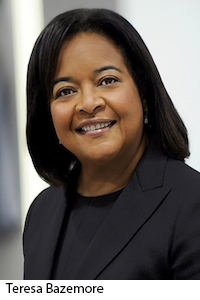
MBA Diversity & Inclusion Interview: Teresa Bryce Bazemore
(Part of a recurring monthly series featuring efforts of the Mortgage Bankers Association’s Diversity & Inclusion Committee, MBA’s commitment to increase racial, gender, sexual orientation and ethnic diversity within the mortgage banking industry.)
 Teresa Bryce Bazemore recently retired as president of Radian Guaranty Inc., Philadelphia. She became president in July 2008; before that, she served as Radian’s chief risk officer and executive vice president. Her previous experience included stints with Nexstar Financial Corp., Bank of America Corp., PNC Mortgage Corp. of America and Prudential Home Mortgage Co. She began her career as an associate with Piper & Marbury and served as law clerk to the Chief Justice of the New Jersey Supreme Court.
Teresa Bryce Bazemore recently retired as president of Radian Guaranty Inc., Philadelphia. She became president in July 2008; before that, she served as Radian’s chief risk officer and executive vice president. Her previous experience included stints with Nexstar Financial Corp., Bank of America Corp., PNC Mortgage Corp. of America and Prudential Home Mortgage Co. She began her career as an associate with Piper & Marbury and served as law clerk to the Chief Justice of the New Jersey Supreme Court.
Bazemore has served in numerous capacities with MBA, including with the MBA Board of Directors; the MBA Residential Board of Governors; and as a Trustee of the Research Institute for Housing America. She received MBA’s Distinguished Service Award in 2005.
MBA INSIGHTS: You recently announced your retirement from Radian. What’s next for you?
TERESA BRYCE BAZEMORE: I’m focused on board opportunities leveraging my governance, risk management, legal, strategic planning, business grown and turnaround expertise. I will also be consulting with mortgage banks and other businesses in the financial services space. In addition, I am helping my husband with his business ventures, including expanding The Juice Merchant to new locations and opening The Pet Friendly Dog Bakery.
INSIGHTS: You spent 12 years with Radian. What was your biggest challenge there?
BAZEMORE: While there were many humongous challenges, one of the biggest was successfully implementing changes to turn around the credit risk management culture both internally and with our customers. Successfully doing this allowed us to turn the portfolio around much more quickly. I have to also mention the challenge of growing the business during a period of survival which is a very unusual accomplishment. This also was a significant factor for transforming the portfolio which is the major generator of future earnings.
INSIGHTS: What were some challenges you faced in your career in breaking the “glass ceiling?”
BAZEMORE: I have been fortunate through most of my career to have great mentors and sponsors, many of them male. One of the challenges I ran into was a reluctance to promote me over more senior male colleagues just because those colleagues would be “upset” even though I was already doing the work to support being promoted. Another is being judged more critically than male colleagues despite my superior performance.
INSIGHTS: What are some simple things companies can do to promote diversity and inclusion in their workplaces?
BAZEMORE: Make sure all employees are getting great work that allows them to show their abilities. Make sure that a talent management program is in place that ensures that employees are being evaluated for leadership and promotion opportunities based on both their accomplishments and potential. Studies have shown that men are often promoted on potential and women are not. That gives men an unfair advantage. Also make sure that development plans are in place and that all employees are receiving constructive feedback to fuel their development.
INSIGHTS: What advice would you offer to Millennials, particularly women and minority Millennials, who are entering the workforce and/or considering their next steps?
BAZEMORE: Volunteer to work on projects and initiatives that are important to the company. That is a way to get visibility in the organization at higher levels.
–Identify the senior managers in your organization that can be sponsors. Having a mentor isn’t enough. You need people with influence championing you in the organization.
–Learn about the business broadly, not just the silo you are in. You will be more prepared for leadership if you understand the linkages across the business and can think more broadly.
–Seek to get constructive feedback and work with your manager and HR to develop and execute a plan to improve in those areas. If your company isn’t giving you helpful feedback, it may be time to move on.
–If you are not happy where you are make sure you are going to a new opportunity that meets your objectives. Talk to not only current employees, but also past employees to understand whether the company has a culture that supports diversity and inclusion. Focus on what is done rather than what is said.
–Get involved in the industry. It will improve your knowledge and allow you to add more value. It is also great to always develop your network.
***
The MBA Diversity and Inclusion Committee was formed in 2013 to provide leadership and guidance to help the real estate finance industry gain a competitive advantage by increasing diversity in leadership, workforce and suppliers.
MBA encourages its members to support these efforts and to recognize the competitive advantages of embracing a diverse and inclusive workforce and marketplace. For more information about the MBA Diversity and Inclusion Initiative, click https://www.mba.org/who-we-are/mbas-diversity-and-inclusion-initiative/about-mbas-diversity-and-inclusion-initiative.
For a more in-depth interview with Bazemore, including her views on mentorship and why and how she got involved with MBA leadership, visit the MBA Inisights webpage, https://www.mba.org/publications/insights/insights-publication.
